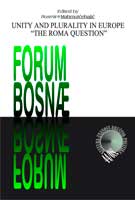THEORIZING THE NON-TENABILITY OF EVIL AS ACTION
THEORIZING THE NON-TENABILITY OF EVIL AS ACTION
Author(s): Keith DoubtSubject(s): Social Sciences
Published by: Međunarodni forum Bosna
Summary/Abstract: There is no place in the world where evil could not occur. Bosnia is not unique. Bosnia, however, is unique in how the problem of evil appeared so clearly. Despite its transparency, though, evil there was neither comprehended nor resisted. This event provoked the writing of Understanding Evil: Lessons from Bosnia. In several ways, the war in Bosnia defied sociological and moral explanation. In theory and in reality, the Hobbesian jungle is so nasty and so brutish, and human life so painful and so short, that in response to this horrid situation human beings with their capacity for reason establish a truce through a social contract that restricts the use of force and fraud. For Thomas Hobbes and most sociologists, the foundation for this social contract is empirical and not metaphysical. The social contract serves individuals’ self interest collectively and thus effectively, and herein lies its stability. In Bosnia, despite the extreme horror of the war, no social contract took hold. Even today, the Dayton Peace Accords could be characterized as a dysfunctional social contract; its content not only fails, but perverts a viable sense of civic and social order in a modern state. Sociology cannot colonize Bosnia with its modern logos. Bosnia instead compels sociology to re-think its discipline, its methodologies and theories, if sociology desires to provide meaningfully adequate accounts of events during the war in Bosnia. Understanding Evil develops the concept of “sociocide” in an effort to account for the subject of evil and in an effort to make sociology stronger. The book is the work of an empirical apostate. Its heresy is essentialism. There is essentialism, however, even in the position of anti-essentialism. Friedrich Nietzsche writes, “It always remains a metaphysical faith upon which our faith in science rests – even we devotees of knowledge today, we godless ones and anti-metaphysicans, still take our fire too from the flame which a faith thousands of years old has kindled: that Christian faith, which was also Plato’s faith, that God is truth, that truth is divine” (2008:166). Nietzsche’s point still stands: there is a profound element of essentialism embedded in the conceptualizing of anti-essentialism.
Journal: Forum Bosnae
- Issue Year: 2008
- Issue No: 44
- Page Range: 91-100
- Page Count: 10
- Language: English
- Content File-PDF

